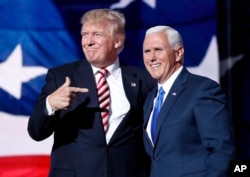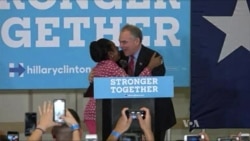Democrat Tim Kaine and Republican Mike Pence will have their moment in the spotlight Tuesday in Farmville, Virginia, site of the only vice-presidential debate of 2016.
This faceoff comes a week after the first of three presidential debates between Democrat Hillary Clinton and Republican Donald Trump, a debate that energized Democrats and disappointed some Republicans.
Opinion polls in the wake of that debate gave a boost to Clinton and raised fresh questions about Trump’s temperament, particularly in the wake of several Tweets by him aimed at a former Miss Universe, Alicia Machado, who was targeted for gaining weight.
The first Clinton-Trump showdown drew a record television audience for a presidential debate, more than 80 million people tuned in.
The vice presidential debate between Kaine and Pence is likely to draw fewer viewers, if history is any guide.
The 2008 debate between Democrat Joe Biden and Republican Sarah Palin drew nearly 70 million viewers, the largest audience for any vice presidential debate in history.
Out of the Shadows
Pence, the governor of Indiana, has been busy on the campaign trail, but is often overshadowed by Trump. Pence is regularly asked to defend some of Trump’s claims and controversial statements, but he also tries to project a campaign image of his own, as he did during a recent rally in Mesa, Arizona.
“I promise you that the Trump-Pence team is going to work our hearts out every day of the week until we revive the American Dream for every American regardless of race or creed or color or gender. We are going to bring the American Dream back to life.”
Tim Kaine, a U.S. senator from Virginia, campaigns in the shadow of Hillary Clinton and often shows up in states where the Democrats’ chances of winning are marginal. He rallied supporters recently with a bipartisan pitch in Texas, solid Republican territory.
“Let’s just treat each other as equals,” he said, “and that is the kind of person Hillary is, and that is the kind of person I am, and that is the kind of person all of you are. That unifies us.”
Looking for a Reset
The vice presidential debate is sandwiched between the first Clinton-Trump faceoff, which generated enormous interest, and a second presidential debate scheduled for Sunday in St. Louis.
Republicans may be looking to Pence to stem the bleeding after that first debate from which Clinton has gotten a bump in the polls and Trump finds himself on the defensive.
“So I think this moment both gave people reason to vote against Trump, but also maybe gave young people, African-Americans, Latinos, you know, key constituencies that Hillary Clinton needs to win, more motivation potentially to turn out to vote affirmatively for her,” said George Washington University analyst Matthew Dallek.
Some analysts, including some conservatives, thought Trump made his situation worse after the first debate with his relentless focus on the former Miss Universe.
Weekly Standard editor Fred Barnes was a guest on VOA’s “Issues in the News” program.
“The more he talks about that, that doesn’t help him,” Barnes said. “That is what you would call off message.”
Although there have been some notable vice presidential debate moments in the past, the vice presidential contenders usually take a backseat to the party presidential nominees.
Democrat Lloyd Bentsen had a memorable takedown of Republican Dan Quayle in the 1988 vice presidential debate over the issue of experience. And Palin held her own with Biden in 2008 after asking Biden at the start, “Can I call you Joe?”
Continued Focus on Trump and Clinton
But even though Kaine and Pence will be in the spotlight Tuesday, it’s likely the names Clinton and Trump will be on the minds of those watching the debate, said John Fortier of the Bipartisan Policy Center in Washington.
“So I do expect that both candidates will be talking more about Hillary Clinton and Donald Trump and taking some swings at them on things that we might expect,” he said. “But even at the top of the ticket, at least certainly in Donald Trump’s case, he is willing to do that himself. So that might not look so different than what we saw in the first debate.”
That likely means more questions about Trump’s taxes and business dealings over the years given recent revelations and continuing focus on Clinton’s use of a private email server while secretary of state, a decision that continues to haunt her on the question of trustworthiness with voters.
Most analysts agree that vice presidential debates rarely move the needle much in terms of swinging public opinion. But Trump is pinning a comeback on a strong performance in Sunday’s second debate, so Republicans are hoping Pence can lay some of the groundwork in his faceoff with Kaine Tuesday. Democrats look to Kaine to keep the focus on Trump.










